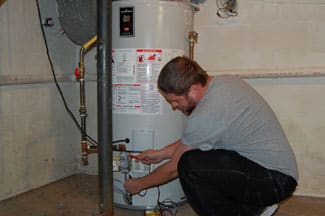Common Water Heater Troubles And Solutions
Common Water Heater Troubles And Solutions
Blog Article
The writer is making a few good points regarding Common Problems with Your Home Water Heater in general in this post which follows.

Envision starting your day without your routine warm shower. That already sets a bad tone for the remainder of your day.
Every home requires a reputable water heater, but just a few understand how to manage one. One very easy method to keep your hot water heater in top form is to check for mistakes regularly and also repair them as quickly as they appear.
Bear in mind to switch off your water heater before smelling about for mistakes. These are the water heater faults you are more than likely to encounter.
Water as well warm or too chilly
Every hot water heater has a thermostat that identifies just how warm the water gets. If the water entering your house is as well warm despite setting a practical optimum temperature level, your thermostat could be faulty.
On the other hand, too cold water may be because of a failed thermostat, a damaged circuit, or inappropriate gas circulation. As an example, if you make use of a gas hot water heater with a busted pilot burner, you would certainly obtain cold water, even if the thermostat remains in excellent problem. For electric heaters, a blown fuse may be the culprit.
Lukewarm water
No matter how high you set the thermostat, you won't get any hot water out of a heating system well past its prime. A hot water heater's effectiveness may reduce with time.
You will additionally obtain lukewarm water if your pipelines have a cross connection. This means that when you turn on a faucet, hot water from the heater streams in alongside normal, cold water. A cross link is simple to spot. If your hot water faucets still follow closing the water heater valves, you have a cross connection.
Weird sounds
There go to the very least five kinds of sounds you can learn through a hot water heater, but the most common analysis is that it's time for the hot water heater to retire.
To start with, you ought to know with the typical sounds a hot water heater makes. An electrical heater might appear various from a gas-powered one.
Popping or banging noises typically imply there is a piece of debris in your tanks, and it's time to clean it out. On the other hand, whistling or hissing noises may merely be your shutoffs letting some pressure off.
Water leaks
Leaks can come from pipes, water links, shutoffs, or in the worst-case scenario, the storage tank itself. With time, water will corrode the container, and find its escape. If this takes place, you require to change your water heater asap.
Nonetheless, before your change your entire container, make sure that all pipes remain in location and that each shutoff works perfectly. If you still require assistance identifying a leak, call your plumber.
Rust-colored water
Rust-colored water implies among your water heater parts is rusted. It could be the anode rod, or the container itself. Your plumber will be able to recognize which it is.
Not enough warm water
Hot water heater come in lots of dimensions, depending upon your warm water demands. If you run out of hot water prior to everyone has actually had a bathroom, your water heater is as well small for your family size. You must think about setting up a bigger water heater container or opting for a tankless water heater, which uses up much less area as well as is much more resilient.
Discoloured Water
Rust is a major reason for filthy or discoloured water. Deterioration within the water container or a falling short anode pole can create this discolouration. The anode pole protects the storage tank from rusting on the inside as well as should be inspected yearly. Without a rod or an appropriately functioning anode rod, the hot water swiftly rusts inside the storage tank. Get in touch with a professional water heater service technician to figure out if replacing the anode rod will certainly take care of the trouble; otherwise, replace your water heater.
Conclusion
Preferably, your hot water heater can last 10 years prior to you need an adjustment. Nonetheless, after the 10-year mark, you might experience any of these mistakes extra consistently. Now, you must add a brand-new hot water heater to your budget plan.
How To Troubleshoot 3 Common Water Heater Problems in Twin Cities
The Water Heater Is Leaking
A leaky cold water inlet valve A loose pipe fitting A leaky temperature and pressure relief valve A corroded anode rod A cracked tank Turn Off Your Water Heater:
Shut off your gas water heater by turning the gas valve on the unit to the “OFF” position. Shut off your electric water by switching its power off at your electrical panel. Look for a two-pole breaker labeled “water heater” and turn it to the “OFF” position. Move the ball valve connected to the water heater to be perpendicular to the piping at a 90° angle. Look for the Leak:
Depending on whether the water is coming from the tank's top or bottom, you’ll want to look for the leak in different locations.
If the leak comes from the top of the tank, carefully look for water escaping from the cold water inlet valve or loose pipe fittings. Rusted hot and cold water valves can have loose connections with the tank, with water leaking out of them.
https://mspplumbingheatingair.com/blog/how-to-troubleshoot-3-common-water-heater-problems
I discovered that article on Common Problems with Your Home Water Heater while looking around the internet. Make sure you take the time to share this blog post if you enjoyed reading it. Thank you for your time. Kindly come by our blog back soon.
Quick resolutions for plumbing disruptions. Report this page